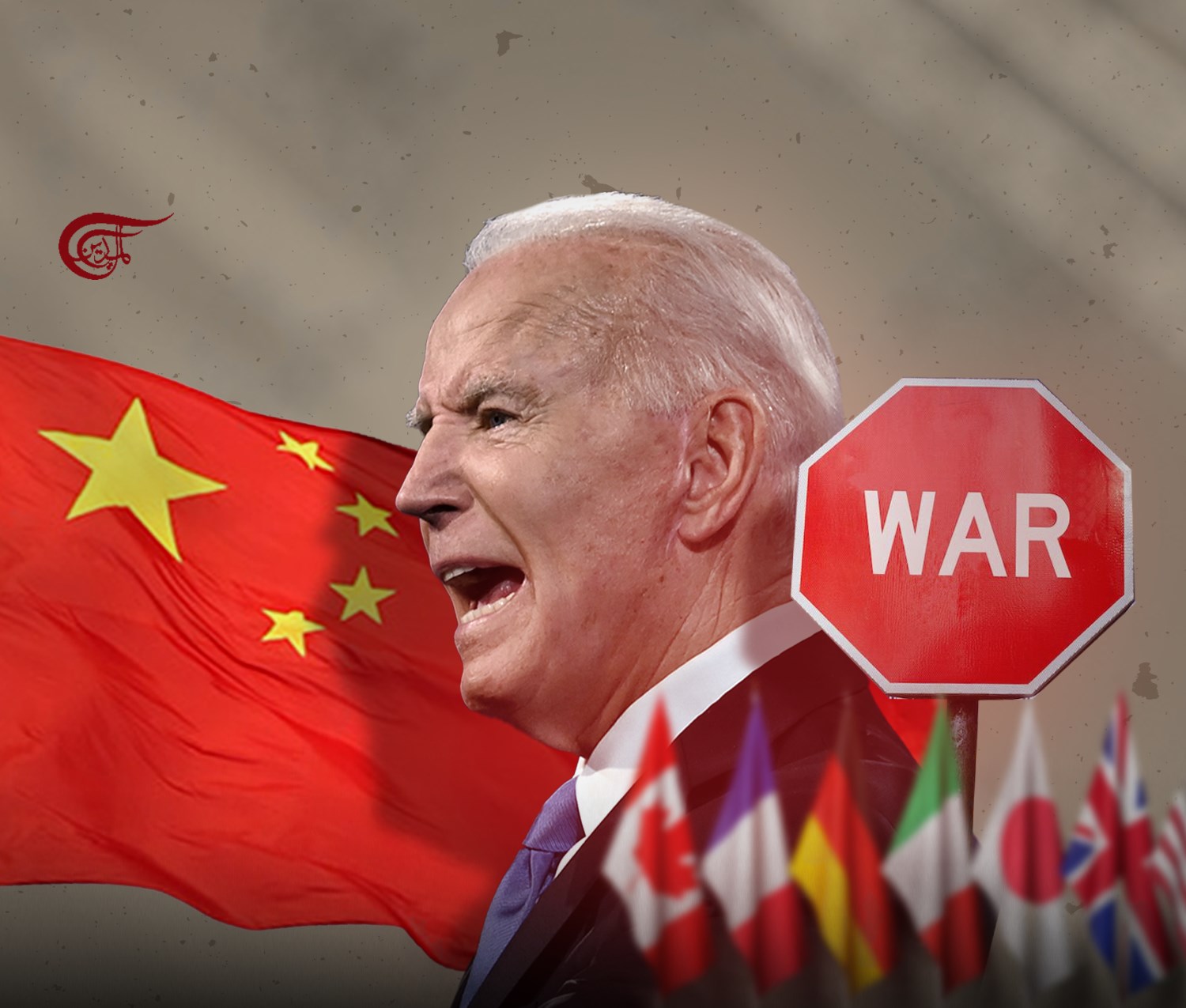The US: The real economic coercer
Being baffled by China's expanding economic power and military might, Biden used the Hiroshima G7 summit as a tool to maintain his strategic competition and confrontation with China.
Taking the title of the revolving Group of Seven (G7) presidency from Germany, Japan hosted the 49th Annual Summit of G7 in the western city of Hiroshima - one of two Japanese cities devastated by atomic bombs dropped by the United States in the last days of World War II on August 6, 1945 - from May 19 to 21 in its capacity as chair of the influential bloc, which consists of the world's seven advanced economies, including the United States, the United Kingdom, Canada, France, Germany, Italy, and Japan, as well as the European Union with 30 percent of global GDP.
This year's G7 summit of leaders under the presidency of Prime Minister Fumio Kishida ended on May 21 with unfounded accusations of China-related issues such as Taiwan, Hong Kong, Xinjiang, and Tibet. Although the focus of the G7 summit at the highest political level should be major issues including the end of the Russia-Ukraine crisis, the troubled state of the global economy, climate change, hunger, poverty, and health, the three-day summit of the “rich countries' club” finally became a US-led propaganda summit against China by orchestrating their "concerns about human rights” and “economic coercion” claim which exposes their “Cold War mentality” toward China, the world's second-biggest economy.
It is as clear as daylight that since becoming the US President in January 2021, Joe Biden has taken an aggressive attitude toward China and stepped up diplomatic pressure on his allies, including European countries, Japan, Australia, India, and South Korea, and forced them to take a strong chorus for economic retribution against China under his so-called Indo-Pacific strategy. In plain speak, being baffled by China's expanding economic power and military might, Biden used the Hiroshima G7 summit as a tool to maintain his strategic competition and confrontation with China.
The Hiroshima communique issued by G7 leaders on May 20 took aim at China on issues including the militarization of the South China Sea, human rights, and alleged interference in their democracies. The G7’s irresponsible comments on China’s nuclear policy and the situation in the Taiwan Strait provoked strongly-worded protests from China’s government and media. “The G7 keeps emphasizing Cross-Strait peace, and yet says nothing about the need to oppose ‘Taiwan independence’. This in effect constitutes connivance and support for ‘Taiwan independence’ forces, and will only result in having a serious impact on Cross-Strait peace and stability," Chinese Foreign Ministry Spokesperson Wang Wenbin said on May 20.
From the very beginning of his reign, following the footsteps of his predecessor, Donald Trump, President Biden has also taken punitive actions against the country’s top trading partner - China in restricting trade and investment in the name of national security. Although the Biden administration has repeatedly said the US is not looking for “confrontation or conflict” with China, Washington's “decoupling” or “de-risking” attempts are reflected on different occasions in different contexts. The issue is retaliation against “countries that take actions that China’s not happy with from a geopolitical perspective. That’s a matter that should be of concern to all of us,” US Treasury Secretary Janet Yellen said at G-7 finance meetings in Niigata, Japan, on May 13. She said she was concerned about China's “economic coercion” with Australia and Lithuania.
On May 20, G7 leaders unveiled the “Coordination Platform on Economic Coercion,” a new framework for countering the use of punitive trade practices for political goals. In their joint statement on economic resilience and economic security, the G7 said, “We will work together to ensure that attempts to weaponize economic dependencies by forcing G7 members and our partners including small economies to comply and conform will fail and face consequences.” The dialogue of the G7 leaders and the rhetorical pitch such as the "weaponization of economic vulnerabilities" in the Hiroshima Communiqué have clearly shown that it is directed against China over its trade practices around the world.
On the closing day of the summit, Biden said the G7 had a united position on China’s “economic coercion”. Harping on Biden’s anti-China voice, British Prime Minister Rishi Sunak said China posed “the greatest challenge of our age” in regard to global security and prosperity and that it was “increasingly authoritarian at home and abroad," according to media reports.
China quite justifiably dismissed the so-called charges made by G7 leaders against China’s utilizing economic coercion to interfere in the sovereign affairs of other nations. China’s Foreign Ministry’s statement noted that the massive unilateral sanctions and acts of decoupling and disrupting industrial and supply chains make the US the real coercer that politicizes and weaponizes economic and trade relations. On May 21, Chinese Vice Foreign Minister Sun Weidong rejected accusations of “economic coercion” and “debt trap" and said the United States is the initiator of breaking the international order and rules and disrupting the running of the world economy. China urged the G7 not to become an accomplice in economic coercion.
It is very interesting that when G7 leaders talked about the importance of cultivating resilience to economic coercion, many countries have different interests and levels of economic engagement with China. For example, Germany and France, outside the European Union, insist that the G7 is not an “anti-China alliance”. Both Germany and France have extensive economic interests in China. In 2022, bilateral trade between France and China exceeded $109.5 billion for the first time, which is about 15 percent more than the previous year.
On the other hand, China has been Germany's top trading partner since 2016 with a bilateral trade relationship that crossed $320 billion in 2022. On April 9, 2023, French President Emmanuel Macron stated, “We don't want to get into a bloc versus bloc logic,” arguing that Europe “should not be caught up in a disordering of the world and crises that aren't ours.” It is obvious that France and Germany are not interested in joining the Biden-led elite club of egoistic democracies in decoupling from China.
Here are a few lines from the report titled “America's Coercive Diplomacy and Its Harm” published by Xinhua News Agency on May 18 that need to be mentioned to expose the US coercive diplomacy. “Violating the principle of fair trade and imposing tariffs on China, the tech blockade against China in the semiconductor sector, using state power to suppress China's high-tech enterprises… on China alone, the U.S. has spared no efforts to bring about all-round suppression, even coercing its Western allies to side with it in targeting China.”
The US and Japan are trying to "demonize" China with the "economic coercion" claim. So far, the United States has imposed economic sanctions on nearly 40 countries around the world, including Cuba, China, Russia, the DPRK, Iran, and Venezuela, affecting nearly half of the world's population. Other members of the G7 also find it hard to escape the economic coercion and bullying of the United States. The US suppression of Toshiba of Japan, Siemens of Germany, and Alstom of France are examples of US economic coercion. In November last year, the Biden administration banned the sale of communications equipment made by Chinese companies Huawei and ZTE. On May 23, Japan announced that it will implement export control measures for semiconductor manufacturing equipment starting in July this year in order to chokehold on China's semiconductor industry. A Reuters report pointed out that Japan's move is to cooperate with the chip export control measures implemented by the United States against China and jointly curb China's ability to manufacture chips.
As such, the G7's charge of China’s “economic coercion” against other countries is even more ludicrous. The successive US administrations have been jeopardizing the rules-based global trading system. As a major developing trading nation, China has made great contributions to the WTO's multilateral trading system, as well as contributing 38.6% to global economic growth higher than that of the G7 countries' combined 25.7% during the 2013-2021 period.
Biden’s desire is to maintain US global preeminence by demonizing China with the so-called “China threat” theory, but China is not a threat to the rules-based international order, rather it is now the largest trading partner of more than 120 countries and regions, and its trade with the world has benefited billions of people. China brings to the world opportunities, stability, and assurance, not challenges, turmoil, or risks.
It is time for the United States to change its worldview and attitude of seeing itself as a superpower nation that leads the world. The US-dominated G7 bloc should abandon its hegemonic practices toward China and other countries and focus on its own internal crises. Above all, America must find a way to coexist with other global powers, such as China, that is not dependent on its global hegemony.

 Rabi Sankar Bosu
Rabi Sankar Bosu
 9 Min Read
9 Min Read












